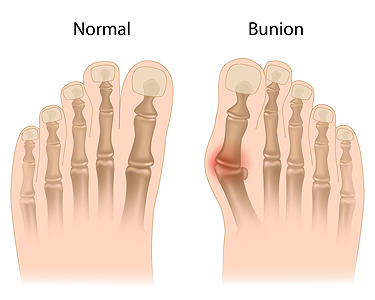
Bunions are painful bumps at the base of the big toe that can make walking uncomfortable and even interfere with your daily activities. When it comes to non-surgical treatment of bunions, often the first step is changing your footwear. Shoes with a wider toe box can give your toes more room to breathe and reduce friction. Toe spreaders can also be beneficial by helping to maintain proper toe alignment and preventing further deviation. Finally, your podiatrist can prescribe anti-inflammatory drugs or pain relievers to provide relief. If non-surgical options fail to provide relief and the bunion severely impacts your daily life, bunion surgery is an option to consider. Two common types of bunion surgery are osteotomy and fusion. Osteotomy involves removing a portion of the bone to realign the toes properly. Fusion surgery entails joining the joint at the base of the toe and is typically reserved for more severe cases. Recovery from bunion surgery can take up to eight weeks, while swelling may persist for several months. A podiatrist can provide personalized advice based on the severity of your condition and your individual needs. It is suggested that you make an appointment today.
If you are suffering from bunions, contact one of our podiatrists of Foot Care Centers of Palm Beach. Our doctors can provide the care you need to keep you pain-free and on your feet.
What Is a Bunion?
A bunion is formed of swollen tissue or an enlargement of boney growth, usually located at the base joint of the toe that connects to the foot. The swelling occurs due to the bones in the big toe shifting inward, which impacts the other toes of the foot. This causes the area around the base of the big toe to become inflamed and painful.
Why Do Bunions Form?
Genetics – Susceptibility to bunions are often hereditary
Stress on the feet – Poorly fitted and uncomfortable footwear that places stress on feet, such as heels, can worsen existing bunions
How Are Bunions Diagnosed?
Doctors often perform two tests – blood tests and x-rays – when trying to diagnose bunions, especially in the early stages of development. Blood tests help determine if the foot pain is being caused by something else, such as arthritis, while x-rays provide a clear picture of your bone structure to your doctor.
How Are Bunions Treated?
- Refrain from wearing heels or similar shoes that cause discomfort
- Select wider shoes that can provide more comfort and reduce pain
- Anti-inflammatory and pain management drugs
- Orthotics or foot inserts
- Surgery
If you have any questions, please feel free to contact our office located in Boynton Beach, FL . We offer the newest diagnostic and treatment technologies for all your foot care needs.
